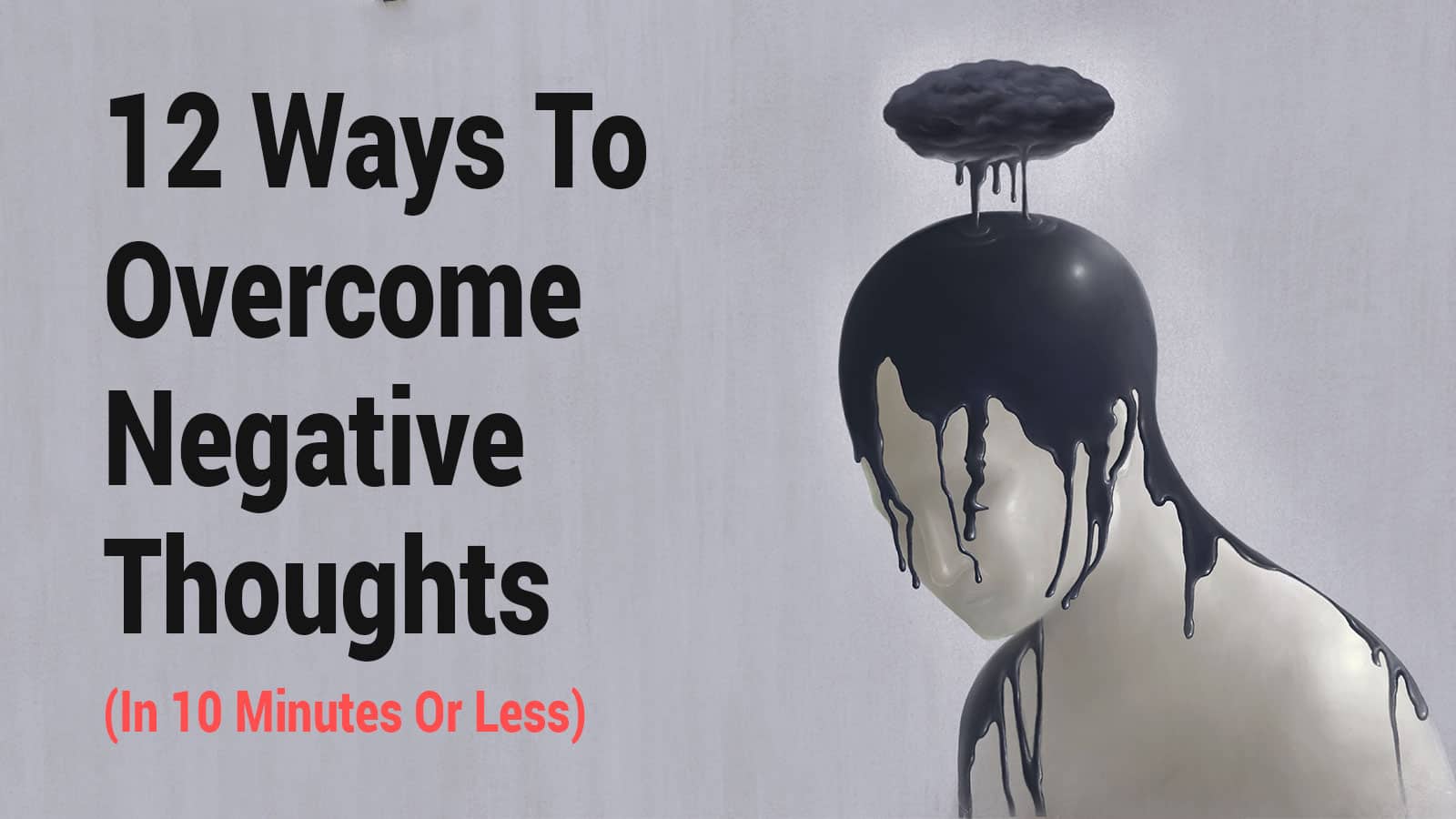Negative thoughts can severely drain your energy, making you feel depressed, anxious, and stressed out. Even at its most harmless, they can take a toll on your self-esteem and lead to self-sabotaging behavior.
As with all bad habits, you can break a pattern of repeated negative thinking – and you’re capable of that with just a little work. There are plenty of tried and true methods that can promote positivity and discourage periods of self-pity and sadness.
Here Are 12 Ways To Overcome Negative Thoughts
1. Actively Look For The Good In Life
Seek out good things, and they will come to you. Sometimes, we’re so used to focusing on the negative that we don’t try to find the obvious positive things around us. As such, it’s a good idea to build a good habit of looking for good things. You can do this by:
- Appreciating the excellent taste of food or drinks you love
- Taking note of subtle things you like in textures, surfaces, and more
- Appreciating opportunities to learn, grow, or improve yourself
- Actively going out and looking for things you enjoy
2. Have Dedicated Time For Negativity
When you’re first starting to fight negative thoughts, you might find that you struggle to contain them. Instead, you might shove them all to one corner of your brain, where they will eventually overflow and cause problems for you later.
Instead of letting this happen, what you can do is set aside some time for yourself to experience negative thoughts. This habit should be a daily practice and should take up no more or less than 10 minutes.
During this time, feel free to think of all the negative things you want. Outside of that time, when you discover a negative thought forming, push it aside, and wait for your next 10 minutes of negative thoughts to give it attention. This exercise will slowly but surely teach you to manage and, eventually, phase out negative thinking.
3. Find New Habits and Skills
Sometimes, imagining the necessity of overcoming the negativity of thought can be intimidating. Instead of trying to eradicate them, try changing the way you think about it. You’re not getting rid of something – you’re forming new habits.
Experiment with new skills and hobbies until you find some that click for you. Aim to find things that make you feel good about yourself. You can:
- Take a new class
- Create a bucket list of things to try
- Tag along with a friend to something they enjoy
- Make new recipes or crafts
4. Take Responsibility
It’s easy to point fingers or play the victim when life has you feeling down. You might say things like:
- It wasn’t my fault
- I had no way of knowing
- I only did that because I was stressed out
- There’s nothing I can do about this
- I have no choice
Yes, some situations are outside of your control. But at the end of the day, it’s your life. You’re responsible for the decisions you make, you’re accountable for your actions and reactions, and it’s time to take control of that.
5. Replace Negativity
Take your negative thoughts and replace them with positive ones. It seems simple, but it can take some getting used to. There are a few steps you can take to catch negative thoughts and turn the tables on them.
- Take note of when negative thought patterns begin to occur.
- Decide that you dislike this pattern and want to change it.
- Figure out how you want this thought pattern to change and what you wish was different about it.
- Find an appropriate thought replacement that matches the goals you made in step 3.
Here’s an example of a situation and the steps taken to solve them:
- I notice that I tend to call myself names like “dumb” or “incompetent” when I make mistakes.
- I don’t like that I talk myself down this way, and it usually just makes me more upset.
- Instead of name-calling, I would like to accept and process mistakes and move on from them without feeling terrible.
- The next time I make a mistake, I will remind myself that even the greatest minds make mistakes, and then I will tell myself that mistakes mean I am learning.
6. Practice Gratitude
Gratitude is a fantastic way to become more positive. It has numerous benefits for both mental and physical health, as well as relationships.
Start a gratitude journal where you record a minimum of 3 things that you’re feeling grateful for every day. They can be anything from small, seemingly insignificant things to huge events. Even on bad days, you can probably find things to be grateful for. This reflection can help put things into perspective and give you a chance to remember things you often take for granted.
Here are some ideas for things to be grateful for:
- Your health
- Access to clean food and water
- Electricity, gas, water, and other utilities
- A roof over your head
- Your friends and family
- Your pets
- Classes you enjoy
- Your favorite books, TV shows, movies, and music
- Things that made you smile, even for a second
- Job opportunities
- Upcoming vacations or plans
- New items you purchased
7. Separate Yourself From Negative Factors
Often, we willingly surround ourselves with negativity without realizing it. Here are some things you may want to separate from yourself:
· Social Media
Look at your feed on the social media platforms you frequent. Are there a lot of people complaining? Or are there lots of people you like to compare yourself to, usually ending with you feeling bad about yourself?
Unfollow “influencers” who make you feel bad about yourself. Remember, their lives aren’t like they portray, anyway. Mute friends or family who are too negative. Control what you see on social media, or don’t use it at all!
· News
News programs, especially the morning news, can be real bummers – and it’s a terrible way to start the day. In fact, research indicates that consuming news of a harmful variety for just three minutes first thing in the morning can hugely impact positive thinking and productivity for the rest of the day.
Yes, keeping informed is essential. But if you really must read sad or bad news, do so later in the day, not in the morning with breakfast.
· People
Surrounding yourself with negative people is guaranteed to bring you down. Cut those toxic people from your life and seek to find friends who are positive, supportive, and kind.
Of course, you can’t ignore negative things forever. But until you learn how to manage negative thoughts properly, steering clear of these factors can work for you.
8. Find A Silver Lining
Every single dark cloud has a silver lining, though it can be hard to see them at first. The next time you find yourself in a bad situation, ask yourself questions to help you find that elusive silver lining. Your questions can include:
- What can I do differently next time to prevent this?
- How would I treat a friend in this situation?
- What’s one positive side of this event, no matter how small?
- What can I learn from this event?
9. Do Positive Affirmations
Positive affirmations can help you to overcome negative thoughts in a myriad of unwanted scenarios, and research indicates that even the worst situations can be made better for those who are used to performing these acts of positive thinking. Here are some examples of positive affirmations that you can try:
- I am intelligent and capable
- I am strong
- Negative thoughts have no power over me
- I think positively in all situations
- I’ve got the strength to overcome adverse circumstances
- I react well to mistakes
- I expel negativity and welcome positivity
10. Express Yourself
Pent-up negativity can burst forth and overflow when you least want it to. That’s why expressing that negativity, especially if it’s very strong, can help you to overcome those thoughts and switch to positive thinking. Here are some ways that you can do this:
- Talk to a friend, family member, loved one, mental health professional, or anyone else you feel you can trust
- Use art as a form of expression; draw, write stories or poetry, make music, rant in a journal or personal video log, dance, sing, or make any art you like
- Express yourself through physical activity; lift weights, jog or run, punch a punching bag, dance, cycle, or do any other kind of exercise
- If all else fails, talk to yourself; rant out loud about your issues
11. Be Kind To Others
Making others happy is a great way to make yourself happier. It allows you to shift the focus off from yourself and your negative thoughts, and the positivity that will spread from your compassion will be contagious (and it may even beget more kindness!). Here are some ideas of things you can do to be kind to others:
- Smile at someone or say “good morning” to someone you pass
- Hold open the door for someone or let them pass first when you’re driving
- Give an honest and thoughtful compliment to someone
- Be there for someone in need
- Help someone out with a problem they’ve been having
- Do a favor for someone
- Buy someone a gift
12. Be Kind To Yourself
Humans tend to be harder on themselves than they are on everyone else. You might be less forgiving for your mistakes and say mean things to yourself. It’s crucial, therefore, to be your own best friend.
What does this mean? Well, if you wouldn’t say what you’re thinking of yourself to your best friend, then you’re unnecessarily cruel. Treat yourself like you would a dear friend, with all the patience and compassion that entails.
Remember, you’re human! You’re going to make mistakes. And, of course, you’re going to have bad days. You’re not going to be perfect, and that’s part of your beauty. Take it easy and be kind. You deserve to be treated with compassion, especially from yourself.
 Final Thoughts on Overcoming Negative Thoughts
Final Thoughts on Overcoming Negative Thoughts
No one wants to be negative all the time. By understanding the patterns behind bad thoughts and working to change them and replace them with better habits, you’ll be giving yourself a happier, healthier life and mind.


















